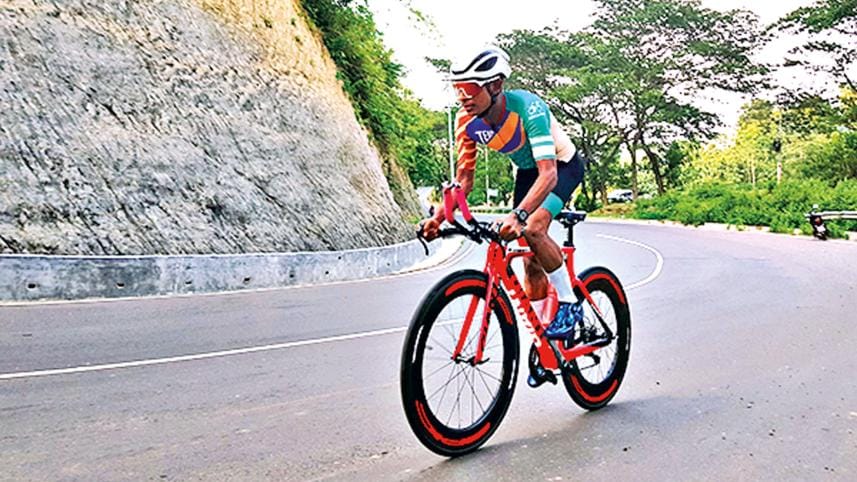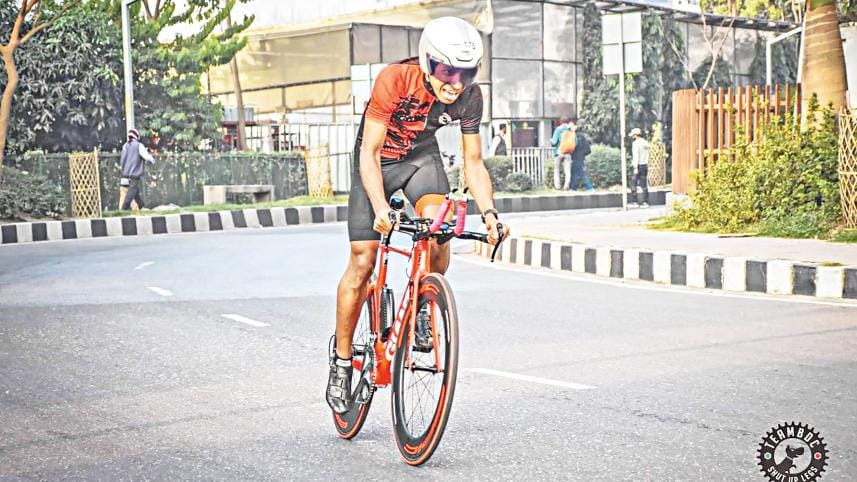The trailblazer taking Bangladesh cycling to new heights

Cycling is one of the few sporting disciplines which has been a constant fixture in every Summer Olympic Games since the games resurrected in modern times in 1896. The discipline features multiple events, depending on the type of bicycle and the platform used for racing. Apart from the Olympics and other major multi-sport extravaganzas, cycling features prominently in world sporting calendar with glamorous events such as Tour de France and Giro d' Italia. Hence, it's safe to say cycling is a global sport which attract audiences worldwide. In Bangladesh, though, the situation is quite different. It is still more of an amateurish pursuit, mostly borne out of either the necessity to commute or as a healthy exercise. While there has been a few of waves in cycling in recent years among the urban youth, those waves have at best fetched a few Guinness records, but next to nothing on the professional circuit. Although there is a cycling federation active for the past five decades, most of its activities are confined within organising a national championship annually. Hamstrung by fund shortages and lack of infrastructure in the country, the federation has failed to produce any medal winner in regional platforms such as the South Asian Games, nevermind bigger platforms on a continental level. In this issue of the Weekly Sports Special, we focus on two individual cyclists who have pushed their passion for cycling to earn accolades against all odds.
29-year-old Rakibul Islam won a gold medal in the 30km individual time trial during this year's 41st National Cycling Championship, following up on previous successes, including in the same event during the 9th Bangabandhu Bangladesh Games 2020. Hailing from a rural village in Rangpur's Badarganj upazila, Rakibul was also champion in the Mujib 100 Years Duronto MTB Race in 2021 and holds a Guinness world record as part of the relay team that cycled the greatest distance in 48 hours (1670.33km) last year. The Daily Star's Mostafa Shabuj caught up with the champion cyclist for an interview, the excerpts of which are below:
The Daily Star (DS): How did you start cycling? When did you realise cycling was a sport?
Rakibul Islam (RI): Neither I nor my family ever wished that I would one day take up cycling as a profession. Before being admitted to Jahangirnagar University I did not know that cycling was a sport and could be taken up professionally. But I grew quite fond of cycling in my childhood.
My father was a primary school teacher. I have three elder sisters, all good students. Therefore, there was a lot of pressure on me to be a good student too. My father had an old cycle, but I was not allowed to use it. One of my sisters secretly taught me how to cycle.
When I was admitted to the Saidpur Cantonment Public School and College, which was 18 km from my village, I was allowed to use the old cycle to go between home and school. My father encouraged me, saying that we had to overcome financial constraints by becoming economical.
Due to those constraints, I did not expect any luxuries. I used to see my sisters wear hand-me-down school dresses. They use to write on paper with a pencil first, then wrote over it with pens.
After admission to the pharmacy department at Jahangirnagar University in 2010, I came to know that cycling was a sport. BDCyclists was an emerging cycling community in Dhaka at that time and I went to Dhaka only to see them train.

In 2012, I bought a bicycle for the first time using the money I had saved up from tutoring jobs. I then joined the JU cyclists club and started training in the morning and evening with friends, teachers and kids. I later attended a cycling race for the first time, which was organised by BDCyclists in 2013.
DS: You won a gold medal in the 41st National Cycling Championship recently, organised by the Bangladesh Cycling Federation (BCF). What was the story behind that?
RI: I was the first cyclist from outside of a service team to win a gold medal in the BCF's 41-year history. When I won a gold medal in the 2021 Bangladesh Games, the time gap between me and the next finisher was only 3 seconds. This time the finish was different. My competitor, who was second in the 41st National Cycling Championship, was one minute and 10 seconds behind me.
I have always been well-prepared and that has kept me ahead of all other contestants. I was a pharmacist with a handsome salary at Evercare Hospital (Formerly Apollo Hospitals Dhaka) from 2017 to 2021. I left the job last August and went to the hilly areas in Khagrachari to practice because I had the upcoming events at home and abroad in sight.
DS: What support does a cyclist need from family and others and what are the challenges they face?
RI: First you need your family's support. Cycling is a less popular game in Asia, even less in South Asia. So parents don't want their children to take up cycling as a profession. Cycling as a sport is also expensive. The equipment you need for racing is not available in Bangladesh. A good quality racing cycle is around Tk 10 lakhs. I bought a mid-range cycle from abroad for Tk 4 lakhs.
Speaking of challenges, I said before that families do not want their kids in cycling. The social collective mindset is to get a government or private job. You need a strong mentality to become involved in cycling because of societal expectations.
Multinational companies doing business are not interested to invest in cycling as sponsors because it is not a popular sport in Bangladesh. They are keener to invest in cricket and football.
We need good infrastructure, where we can practice and we need to arrange racing competitions. We don't have a velodrome or cycling track in our country. We only have busy roads, where cycling is risky. We do not have good coaches either. But foreign coaches are always expensive.
DS: How do you prepare for competitions?
RI: I always believe in discipline and hard work. I left my job to stay fit. I had to give my foreign coach over USD 1,000 over the past five months. I don't have any coach now. I self-coach. I learn online and maintain modern structural training.
DS: What is the overall scenario of Bangladesh cycling? What are its limitations?
RI: Again, I have to say that cycling's unpopularity in Bangladesh plays a role, even compared to other South Asian countries like India, Sri Lanka and Nepal.
In the BCF, they don't follow the modern protocols most south Asian countries follow. BCF has many limitations. They have no budget, no good coaches and no infrastructure. If the government invests a little money in cycling, we have a chance to get many medals from international events like the Powerman World Championship, Powerman Duathlon Asia Championship and Olympics.
However, some community groups made positive impacts in the past 10 years. BDCyclist ran many campaigns and organised many events to make cycling popular as a mode of transport.
We can find community cycling groups formed in every district town. They are the pioneers of community cycling in our country. In the past two-three years, social media and mainstream media have played a vital role to make cycling popular by covering our events. So, many youths now know cycling is a sport.
DS: After leaving that handsome salary, how are you faring now?
RI: I got my National Level Coaching Certification from India in 2022 and completed a Coaching Female Triathlete Course in Spain in 2022. I now work as a physical trainer, with clients from many corporate offices, and earn almost double what I made as a pharmacist. Many of the younger cyclists have also already started earning this way. It's a new beginning.
DS: What is your future target?
RI: I am working hard to fly the nation's flag in the international arena. My next target is to participate in the 2022 Powerman World Championship in Switzerland and the 2022 Powerman Duathlon Asia Championship in Malaysia.



 For all latest news, follow The Daily Star's Google News channel.
For all latest news, follow The Daily Star's Google News channel.
Comments